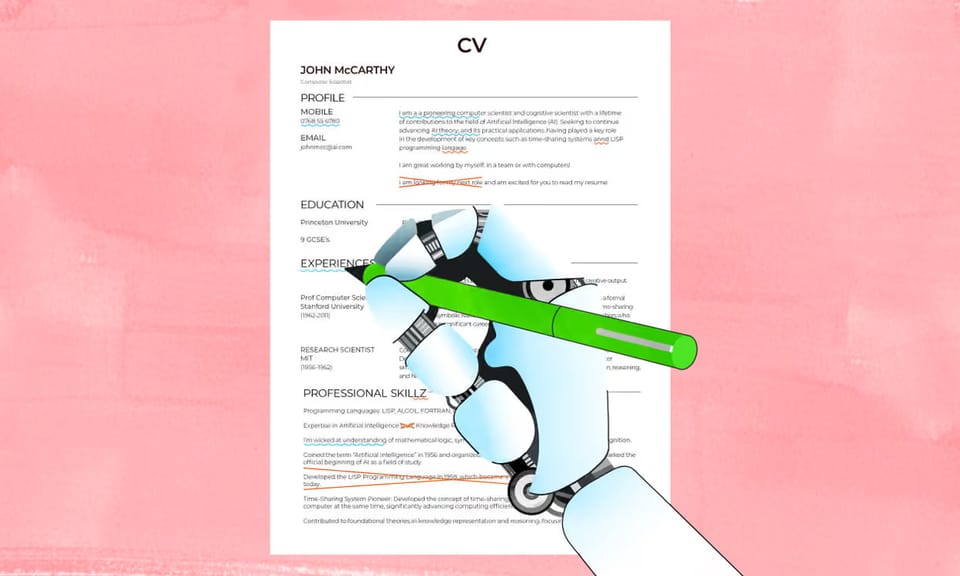Will companies honestly report if AI caused layoffs?


Big headlines you don’t want to miss:
- Trump might use force to stop Iran’s nuclear plans, with AI tracking the threats
- A Lear exec sold most of his stock
- New York now makes companies say if AI caused layoffs, others may copy soon
Let’s get into it.
Politics
Will Trump Use Military Force to Stop Iran’s Nuclear Plans?

Briefing: Vice President JD Vance says President Trump might take more action to stop Iran’s nuclear activity, warning that the situation is getting too serious to ignore.
Details: In a social media post, Vance said Iran is enriching uranium to levels way beyond what’s needed for peaceful use. He hinted that Trump could step in more forcefully if Iran doesn’t back down. Vance also defended Trump’s approach so far, saying he’s shown “restraint” by keeping the military focused on protecting Americans, not escalating things without reason. He criticized Iran for breaking its nuclear obligations and said Trump is only interested in doing what’s best for the American people.
Why It Matters: This message raises the chances of stronger U.S. action against Iran and puts the spotlight back on its nuclear program. Any major move could shake global politics, risk military conflict, or affect energy markets. (BBC)
AI is already being used to monitor Iran’s nuclear sites through satellite image analysis and anomaly detection, helping flag suspicious activity in near real time. At the same time, AI systems like Project Maven are speeding up military decision-making, meaning any shift in Iran’s behavior could trigger faster, tech-driven responses from the U.S. or allies. (Business Insider)
Business
Lear Exec Sells $110K in Stock, Smart Move or Big Red Flag?
Briefing: One of Lear Corporation’s (Lear Corporation makes car seats and electrical systems for major automakers around the world) top directors, Conrad L. Mallett Jr., just sold most of his shares in the company. The move caught people’s attention because it happened while the company’s stock is trading near its lowest point this year.
Details: On June 16, Mallett sold 1,187 shares of Lear stock, cashing out around $110,000. That’s about 93% of the shares he owned, leaving him with just 84 shares. The sale price was about $92.86 per share, which is close to the stock’s lowest price so far in 2025.
Despite this big sale, Lear is actually doing pretty well financially. In the first quarter of 2025, the company beat Wall Street expectations with earnings per share of $3.12 and revenue of $5.56 billion. After that strong report, banks like JPMorgan and Bank of America raised their target price for the stock to over $115.
Also, some analysts say Lear’s stock is undervalued. Its price-to-earnings (P/E) ratio is lower than others in its industry, and one financial model (called GF Value) suggests the stock should be worth closer to $145.
Why It Matters: When a company insider sells a lot of stock, investors often worry that something is wrong. But in this case, experts say the sale looks like a personal move, not a sign of trouble. Other insiders have actually been buying shares, which helps balance things out. Lear’s earnings are solid, analysts are still optimistic, and the stock might be a good deal at today’s price. So while this sale made headlines, it doesn’t necessarily mean bad news for the company. (International Business Times)
If you're interested in AI, tools like Accern, Quiver Quantitative, and TipRanks are like smart digital detectives. They watch insider stock trades like when a company director sells their shares and compare them to thousands of past trades to figure out if it’s something to worry about or not. In Lear’s case, these tools would likely say the sale looks normal. That’s because other insiders are still buying stock, and the company’s earnings were strong. So, the move doesn’t raise a big red flag right now. (Quiver Quantitative)
Finance
Is AI to Blame for Your Layoff and Should Companies Have to Say So?
Briefing: New York just became the first state in the U.S. to require companies to say if AI or automation was the reason behind any mass layoffs. The rule kicked in this past March and adds a new checkbox to the state’s WARN (Worker Adjustment and Retraining Notification) form. If a company selects “automation,” they also have to explain what kind of tech was used like AI, robotics, or software systems.
Details: This rule applies to mass layoffs, which means job cuts involving 50 or more employees. Companies must submit WARN notices at least 90 days in advance. The policy was first announced by Governor Kathy Hochul back in January 2025 as part of her State of the State address. So far, no company has officially listed AI as the reason for job cuts, but experts believe this requirement will help track automation’s real-world impact on employment.
Why It Matters: For workers, this rule offers some transparency; they'll know if technology played a role in their job loss, which could help guide their next steps. For policymakers, it’s a way to gather solid data to better design retraining programs or future labor policies. And for other states, New York’s move might serve as a model, especially as AI and automation continue to change how companies operate. (Entrepreneur)
Will companies honestly report if AI caused layoffs? Can this data shape better worker protections? Early signs show limited disclosure; New York City’s AI hiring audit law had poor compliance, with few firms posting full reports. Still, the U.S. Department of Labor now promotes AI transparency and worker safety. New York’s rule could help, but only if enforced and used to guide future policies. (DOL AI principle)
*Disclaimer: The content in this newsletter is for informational purposes only. We do not provide medical, legal, investment, or professional advice. While we do our best to ensure accuracy, some details may evolve over time or be based on third-party sources. Always do your own research and consult professionals before making decisions based on what you read here.




